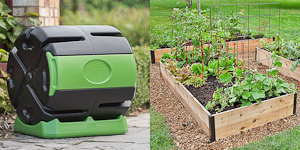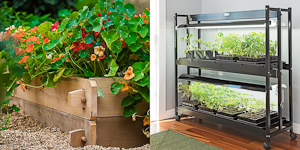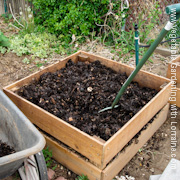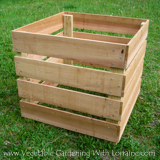- Home
- How to Make Compost
- Benefits of Compost
The Many Benefits of Compost
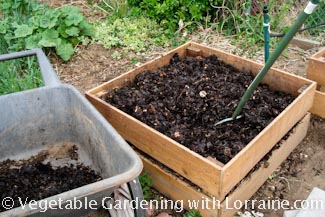 Crumbly Compost Feeds the Garden and the Good Soil Microbes
Crumbly Compost Feeds the Garden and the Good Soil MicrobesThe benefits of compost are so dramatic that no garden should be without a system of regularly incorporating it.
A beautiful and productive vegetable garden can be thought of as an up-and-down cycle. Nutrients are brought up out of the soil and into the plants, which we then eat to build and fuel our bodies. In the "old days" our human waste (and eventually our bodies) would return to the soil, recycling the minerals and other nutrients back down.
In our modern, congested world, our waste (nitrogen), our crop residues (carbon, potassium, calcium, magnesium, etc.), and eventually our bodies (all of the above), go elsewhere (the ocean, the landfill, the atmosphere, etc.). We have kept taking the minerals and organic matter up and out of the ground without replacing them.
The Role of Soil Microbes
It's not quite as simple as it sounds. This up-and-down cycle involves a miraculous web of microbial life.
An incredibly complex web of soil microorganisms break down the dead plants, animals and waste into simpler forms, and then literally "feed" the plant roots what they need in exchange for sugars exuded by the plant's roots. They are like waiters in a restaurant, bringing food and getting a tip.
These soil organisms also need compost and minerals to live and do their jobs.
The many benefits of compost make it one of the experienced gardener’s most precious “crops”. I make a ton of compost, using two of the homemade compost bins shown above. (We need to replace minerals too, but that is covered on the organic fertilizer page.)
Properly made compost has almost no smell and breaks down
fairly quickly into beautiful “black gold”. Finished compost is
crumbly, dark, and rich in humus, a stable organic compound with huge
benefits to the garden. And frankly, I think composting is great fun,
and I'm proud of every crumbly ounce.
Now compost isn't everything, as we shall discover, but it is a crucial part of a successful vegetable garden.
Agricultural soils have now become so depleted that our food contains a fraction of the nutrition that it used to 100 years ago. (If you don't believe me, Google around...)
Artificial fertilizers used by commercial agriculture don't fully replace what is taken and they damage soil ecology. Tillage practices also destroy the microbial life.
Taking control of the nutrition in your food is one of the most powerful reasons to grow a garden, and to compost.
The Top Seven Benefits of Compost
Improved soil structure.
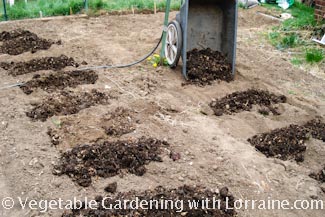 Applying the Benefits of
Compost to My Garden
Applying the Benefits of
Compost to My GardenThe humus provided by compost is essential for healthy soil structure, which is how soil holds together. How soil clumps may seem irrelevant to us, but it is very important to plants. How the soil aggregates together ("soil structure") is dependent on a healthy soil ecosystem that creates nice loose soils that are good for plant roots. This ecosystem is supported by compost.
Optimal water retention.
Compost holds both air and water in soil, dramatically slowing the change from too-wet to too-dry. This creates an optimal environment for the most steady plant growth.
Enhanced soil microflora.
This is perhaps the most important of all the benefits of compost. Some of the microbes that live in the soil actually "feed" the plants their nutrients in a symbiotic relationship. Bacteria, fungi, and little dudes called actinomycetes make minerals available to plants, keeping plants healthy and strong. A large percentage of the mass of compost is these beneficial microbes.
Improved plant nutrition.
Properly-made, balanced compost provides a
huge range of macro and micro nutrients for plants (like nitrogen,
potassium, phosphorus, and many micronutrient minerals), much like a
balanced diet does for people. Chemical fertilizers are harsh and kill
the symbiotic organisms that help feed plants naturally, in a similar
way to how salt kills a snail. The soil organisms are necessary in a
natural system to make the food available to the plants.
Increased pest resistance.
Healthy plants grown in compost-and-mineral-rich soil are healthy, and plants that are healthy are less attractive to plant pests. Bugs are attracted to weakened plants, much like a lion is attracted to a weakened antelope!
Nutrition bank account in the soil.
The stable carbon compound known as humus is organic matter that has completely broken down, and it is very stable, even for millennia.
Humus binds positive ion nutrients like calcium and magnesium in the
soil, keeping them from washing away, and holding these nutrients "in
escrow” until the plants need them. When plant roots need those
minerals, they are there for them to take. (It's actually the microbes
and fungi that take the minerals from the humus and "feed" them to the plant
roots, in exchange for sugars that the roots exude.)
Higher nutrient-density food for us.
Healthy plants grown with rich compost and natural minerals not only taste better, they are richer in vitamins and minerals, and with a more diverse nutrient profile. This translates into healthier food for us.
An excellent and fun book about this which is full of wonderful color photographs is Teaming with Microbes by Jeff Lowenfels and Wayne Lewis.
Help share the skills and spread the joy
of organic, nutrient-dense vegetable gardening, and please...
~ Like us on Facebook ~
Thank you... and have fun in your garden!
Affiliate Disclaimer
This website contains affiliate links to a few quality products I can genuinely recommend. I am here to serve you, not to sell you, and I do not write reviews for income or recommend anything I would not use myself. If you make a purchase using an affiliate link here, I may earn a commission but this will not affect your price. My participation in these programs allows me to earn money that helps support this site. If you have comments, questions or concerns about the affiliate or advertising programs, please Contact Me.Contact Us Page
